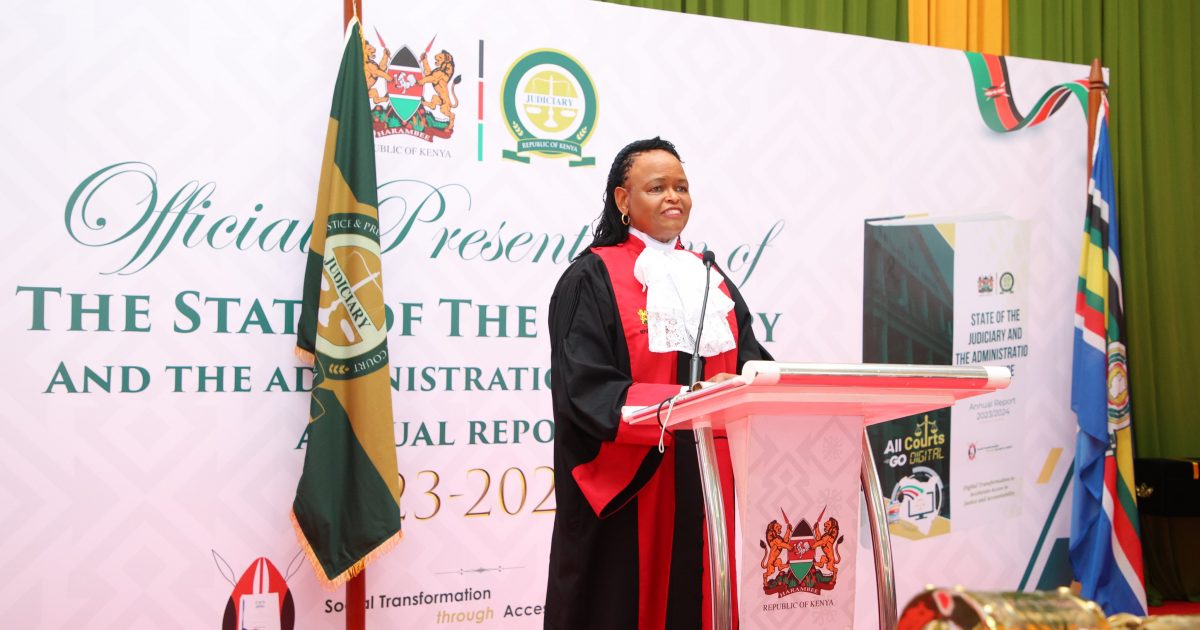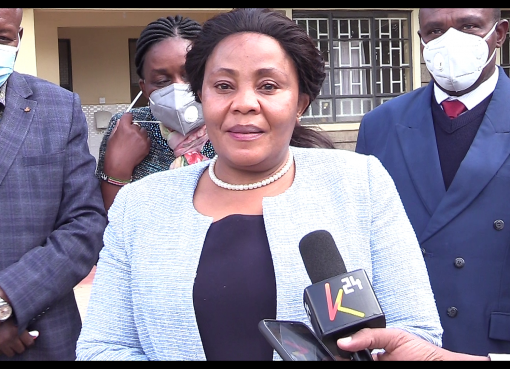The Judiciary has recorded an upward trajectory in the administration of justice, reflecting an institution that is increasingly efficient, accessible, and responsive to the justice needs of Kenyans.
Speaking during the presentation of the State of the Judiciary and the Administration of Justice (SOJAR) Report 2023/24 at the Milimani Law Courts on Friday, Chief Justice (CJ) Martha Koome noted that there were substantial improvements in the Judiciary’s performance and service delivery despite historical chronic underfunding of the justice sector, with the Case Clearance Rate reaching an impressive 99 percent with 516,121 filed compared to 509,664 resolved in the last Financial Year.
CJ Koome said that there had been a marked improvement in reducing pending cases, which dropped by 2.16 percent from 649,342 to 635,262.
“Our case backlog, reduced by 10 percent, with the Employment and Labour Relations Court (ELRC), Environment and Land Court (ELC), Tribunals, and Kadhis’ Courts leading the way in backlog reduction by 37 percent, 20 percent, 29 percent, and 82 percent respectively,” Koome said.
The CJ noted that each case resolved is not merely a number but represents justice delivered to Kenyans, affirming their trust in the judicial system adding that the decrease in pending cases is a testament of Judiciary’s commitment to tackling case backlog and ensuring timely resolution of disputes.
“This achievement speaks to the determination and hard-work of our Judges and Judicial officers, who, despite operating under an environment of resource constraints, have managed to deliver these impressive results. Each case resolved is not merely a number but represents justice delivered to Kenyans, affirming their trust in our judicial system,” said Koome.
Further, the Chief Justice indicated that the Judiciary extended the High Court’s presence to 46 out of 47 counties, established 27 Small Claims Courts across the country and operationalized 57 mobile courts thereby reducing the average distance to court services to 80 kilometres.
She noted that the Judiciary had established eight Alternative Justice Systems (AJS) Ukumbi suites and launched AJS County Action Plans in four counties, effectively integrating traditional and community-based conflict resolution mechanisms into the formal justice system.
“These initiatives reflect our ongoing commitment to delivering justice that is not only timely and efficient but also inclusive and responsive to the diverse needs of Kenyans across the country.”
Justice Koome explained that the Judiciary had leveraged technology to revolutionise justice delivery and invested in ICT infrastructure, to bolster the reliability of Judiciary’s digital platforms.
“E-filing is now fully implemented in all our court stations, allowing court users to file cases online, enhancing file security, and eliminating the longstanding challenge of lost physical files,” the CJ said.
She added, “We connected 67 court stations to the National Optical Fibre Backbone Infrastructure (NOFBI) and upgraded the Local Area Network (LAN) in 42 stations. These enhancements ensure that our digital justice systems remain robust, reliable, and accessible.”
Justice Koome said through these transformative efforts, Kenyans are now able to access justice in closer proximity to their communities noting that the realisation of affordable and accessible justice for all is steadily becoming a reality.
The CJ however decried the inadequate funding of the Judiciary which had consistently fallen short by nearly 50 percent for the past three financial years saying this limited its capacity to meet the expanding demands of the institution.
“In the past financial year, we received only Sh22.42 billion, significantly below the required budget of Sh43.17 billion. This funding gap restricts our ability to expand infrastructure, enhance security, and support the wellness of our judicial personnel,” the CJ decried.
The Chief Justice expressed the need for further investment to fully staff the Judiciary to meet the needs of a growing caseload and enhance service delivery.
She also called on the Legislature and the Executive to recognise the needs and allocate additional resources necessary to support the optimal operation of the Judiciary.
By Joseph Ng’ang’a





